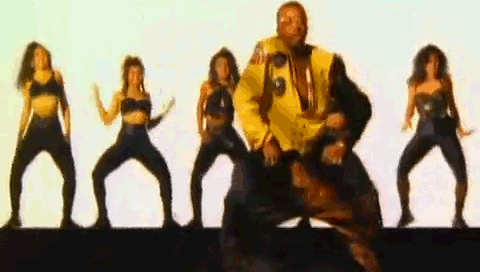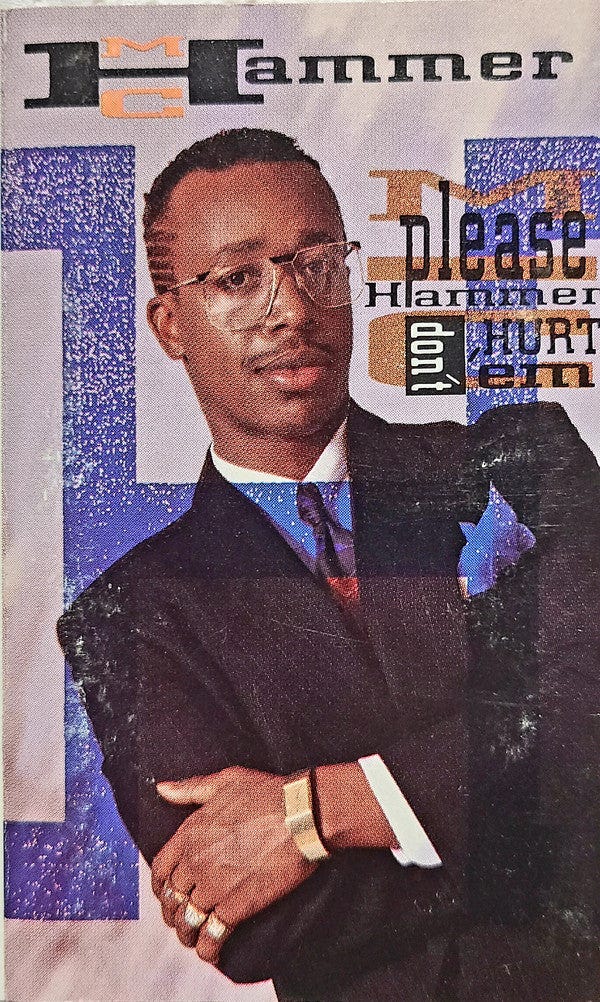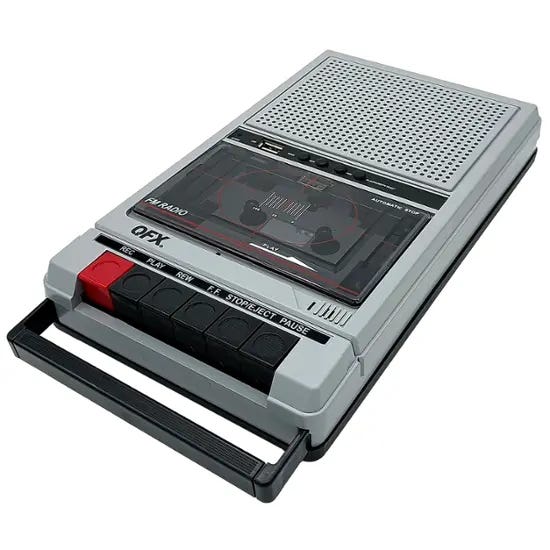Hi Son,
I initially grew up in south Kansas City, just north of Grandview. The elementary school I attended up until fourth grade was Santa Fe Elementary (go Mustangs!). Lunch periods were typically held in the classroom. I can’t remember if we had a cafeteria with seating, but we did have the option to get a hot lunch from the school each day and then take the tray back to our desks. My second grade classroom had a cassette tape player, similar to the type I have a photo for below. It wasn’t a fancy Boombox or stereo system. However, you could hear it just fine from any area of the classroom. One day one of my classmates brought in a tape to listen to while we ate lunch. I kind of knew who the musical artist was, mainly from the most mainstream track on the album. The first song came on and I was kind of blown away. As blown away as an 8-year-old can be from hearing music. I think I was more into the tape because my classmates were into it as well. It went “Oh oh, oh oh, oh oh oh oh, oh oh. Here comes the Hammer!”
It wasn’t long after hearing “Please Hammer Don’t Hurt’Em” on the tape player that I wanted to get a copy of the cassette tape myself. I don’t know if this is accurate, but I believe this was the first cassette tape I wanted and owned. My parents had cassette tapes and vinyl, but none of those albums were anything that I could have called my own. The most popular track on the album was “U Can’t Touch This.” It would become the most famous/imfamous song that MC Hammer released. Famous because of how big of a hit it was. Infamous, because it sampled Rick James “Superfreak” that caused James to sue Hammer. As a child, I thought the entire song list was great. Maybe because it was hip hop, but also more of a wholesome type of hip hop. Your grandparents also raised me as a Christian in the Reorganized LDS (I can maybe explain that offline), so having a track called “Pray” really appealed to me and also your grandparents. Hip hop was starting to become really popular as a music genre and I felt like I found my niche within the hip hop stratosphere.
Outside of my enthusiasm, MC Hammer was a phenomenon in the entertainment world. There were two things you could associate with Hammer. Dancing and those huge-ass pants. Honestly, there really was nothing that I can remember like it. He really could put on a show.
The era where Hammer grew to fame had him more as an outlier than consistent with the rest of the hip hop culture. As I mentioned before, his image and music was wholesome. That was great appeal for an 8-year-old growing up under a God-fearing household. However, now being agnostic to religion, listening to this collection of songs in 2024 has an extremely different feel to it. I put on this album last week and immediately thought how generic and cookie cutter this music sounded. MC Hammer grew to popularity in an era where Gangsta Rap was rising significantly in the late 80s/early 90s. This probably underscores how my preference in music has significantly changed and you would even say matured. MC Hammer wasn’t a gangster at all. He was the “founder” of Pop Rap, which really did not coincide with the rest of Hip Hop.
Hammer’s rise was followed by a pretty big fall a couple of years after. So much that he tried to change his sound to more of a Gangsta tone. It didn’t work. What’s interesting is that he was considered a sell out for trying to become less wholesome and flamboyant as a dancer. Normally when you call someone a sell out, they go more generic to appeal to the mainstream audience and incorporate more showmanship to their image. An example of counterculture if there ever was one.
His biggest rise in the industry was bookended by artists/groups like N.W.A., Public Enemy and Ice-T before “Please Hammer Don’t Hurt’Em” and followed by Dr. Dre, Snoop Dogg, Wu-Tang Clan, Tupac Shakur and Notorius B.I.G. You’ll see some Gangsta Hip Rop albums in later entries from me. While Gangsta Hip Hop was riddled with the perception of promoting violence, drugs, and alcoholism it still had a purpose and a message behind it. Although I would argue the message of Gangsta Rap was bringing a lot of social issues to the surface in a very forward and blunt way. Unfortunately, Hammer’s music doesn’t age well for me because of this. It was an interesting window in the music industry. One that many will never forget.







Brings me back to middle school!!
I loved Hammer!!! (And when my husband was a kid, he had a hamster named… you guessed it… MC Hamster! 😂